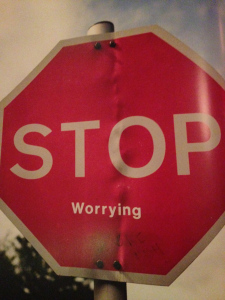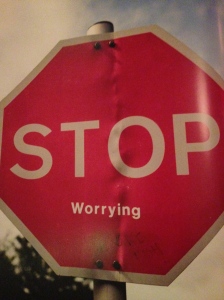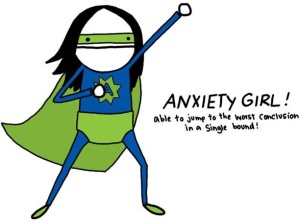
10 Jan pt. 13. Oh, the thinks you can think
This is a post about my experience of anxiety. I briefly wrote about this before christmas (here) and this is the follow up…
———
When I was in a bad way (and for a number of years this was pretty much all the time) I only had to hear about someone else who was ill and I would begin to imagine that I was next.
I couldn’t hear a news report about bird flu, or listen to a friend talk about her child who was sick without starting to create mental images in which I was the protagonist of this illness drama. My mind would run wild, imagining me being sick, my family getting ill, the consequences and repercussions of this.
“Anxious people tend to have very good imaginations, the trouble is they continually, albeit unintentionally, misuse them to generate emotionally arousing worry”
It might not sound that bad, but these thoughts came to control my actions. Whether I would go out, what I would eat, whether I would get any sleep. It narrowed my life.
Initially Matt would ask what was wrong and I would tell him. He would rationally explain to me that I wasn’t going to be ill, and neither were the kids. That I was being ridiculous.
After this had happened a few times sometimes he got cross with me because these thoughts were distracting me from real life, stopping me from engaging with him and the kids. It was isolating me.
Sometimes Matt tried to make a joke out of it, or he tried to distract me – to pull me out of the anxiety vortex.
None of these approaches really worked. He was trying to speak to me as though I could gain some control over this thought process if only I could see how ludicrous it was.
I knew it was ludicrous, this wasn’t news to me.
But i still couldn’t get myself out of the film that was being played on a loop in my mind. I would think , – I was weak and needed to get a grip, -if i had more will-power or self-control I wouldn’t think like that. Or, on a day when I was feeling a bit holy, I would think I was not a good enough Christian because properly righteous people wouldn’t worry – they would be full of faith.

I remember a book called ‘Don’t Dread’, by a Christian writer called Joyce Huggett (I think). I never read it, but I remember thinking ‘if only it was that easy… if only I could just choose to stop’. The ‘pull-yourself-together’ school of thought left me in little doubt that I was probably doing something wrong or not trying hard enough and that was why I couldn’t get any ‘victory’ over my anxiety.
When you tell people how anxious you feel they want to help. But without any knowledge or understanding of mental health, and prior to my diagnosis, this ‘help’ was often pretty unhelpful (although totally well-intentioned). It just confirmed to me, somewhere deep down what I had thought all along, that I was not good enough.
“suffering extreme anxiety is not a sign of weakness or lack of moral fibre: it is purely a response to stress”
Thank goodness for a diagnosis, and for people who could teach me the tools to deal with the mess in my head.
(At one point my therapist told me that inside my brain was probably a bit like spaghetti – all the roads and routes which enabled mental health had got crossed and confused. Stress does that. And trying harder doesn’t fix it.)
Once you have been down this anxiety-laced rabbit hole a few times your brain becomes highly adept at heading back to that place. Any trigger can send you there. The path of that thought process become well-worn. Your brain becomes more efficient, enabling you to go from totally fine to utterly distracted in seconds.
The physical symptoms of my anxiety, the chest tightening, stomach churning, heart racing would only serve to confirm the messages that my brain was telling me. I was ill! As my imagination hooked onto a small trigger and created a world of horrific possibility, my physical body would then react as though this was real. The ‘fight or flight’ mechanism was activated. My mind told me I was under threat. When I experienced this my body was flooded with ‘stress’ hormones to enable me to either fight my attacker, or to run. Inside my head the sirens were wailing and red lights were flashing.
In reality I was stood in B and Q trying to buy something without looking like a mad person. Trying to maintain an appearance of normality when everything internally was going crazy.
(Fun times!)
After a while my ‘fight or flight’ mechanism was activated so much that I lived in a perpetual state of anxiety. Obviously there would be surges from time to time which often resulted in panic attacks, but my body was dealing with a low level of anxiety arousal most of the time.
“…This is a cumulative process and, with each additional stress, not only does more and more arousal occur but more and more expectation patterns stay switched on in our brains.”
Something had to change.
———
Over the last few years I have learnt a number of techniques to deal with anxiety. Some are specific and work when I feel I am hurtling towards panic-attack central, others are good techniques to lower my stress levels and enable me to relax – which in turn dials down the level of anxiety i am feeling.
Here are my top 5:
1. Let yourself off the hook.
I was stressed to the eyeballs, knackered and expecting to be able to fix myself while sleep deprived and believing I was weak – never going to happen! I had to re-learn what it meant to be healthy – and, in many ways, how to live. I had to address a lot of negative baggage to do with my faith and the expectations I placed on myself. This happened through therapy with my brilliant therapist. I’ve said it before but, you don’t need to be a character in an American drama to benefit from therapy. In my experience it was the most important factor in learning how to live well.
2. Learn how to rest.
My brain was fried. I couldn’t rest – I didn’t know how to. I had to re-learn. A lot of this was through a relaxation technique. There are many slightly different approaches to relaxation but I think they are all aiming for the same thing – to bring some rest and healing to a frazzled mind. The technique Sam taught me kicked off with a breathing pattern (7/11 breathing) and then visualisation. It is a form of meditation I suppose. Initially Sam had to talk me through the relaxation process. It felt a bit Paul McKenna to begin with, but it really works! I would enter a different kind of head space. According to Sam (and other people who know stuff), while you are in this state not only are good pathways – to rest and relaxation – learnt, but your brain is also able to repair. After using this relaxation technique I feel like I am thinking clearer, am more peaceful and more in control. There is an app that has been recommended to me by a couple of people, to aid with relaxation, you can find it here.
3. Living well.
Eating well and not drinking too much. Cutting back on caffeine. Boring maybe, but it definitely helps.
4. Being outside.
I have already written about this here, but being in the open air is pretty brilliant for your head (and body, and soul…)
5. Doing some exercise.
I need to do some exercise regularly as, for me, it helps me to regulate my adrenalin production. It stops me feeling jittery. It helps me feel in control. Sometimes if i can feel the anxiety creeping up my neck, threatening to derail me, going for a run (or if i am at home and can’t get out – running up and down the stairs numerous times) will set be back on track, clear headed and calm.
Just outside the top 5, but also worthy of mention:
Gardening, doing something creative, and laughing (note to self – must do more of this).
——-
This list is definitely not definitive – just what works for me. It isn’t rocket science, but it is hard work. I have learnt to be a bit disciplined about maintaining peace. It can save me a whole load of pain.
(I also probably should say that I did one and half years on anti-depressants when I was first diagnosed with depression in 2009- which helped to stabilise me. I still had to do all the stuff I have mentioned above though… the drugs just gave me the volition to begin to do those things.)
There is hope:
Most of the time now I don’t feel anxious at all. It doesn’t consume me. And if I have a moment where I can feel something kicking off in my head I have a number of strategies by which to deal with it. And they work nearly all of the time!
And i feel like a different person living without anxiety… Seriously. It’s good. Turns out, I wasn’t weak. I just wasn’t very well and needed to learn some new skills to get better and stay better.
If you are on this journey – keep going. Be encouraged.
——–
Finally – there is a great book about anxiety which is really helpful and easy to read. It explains why you might feel anxious – what is going on physically and mentally, looks at some triggers, and gives techniques for dealing with anxiety and panic attacks. It is called: How to Master Anxiety by Joe Griffin and Ivan Tyrrell. Highly recommended. (The quotes I have used in this post come from this book).
** The anxiety-girl illustration is taken from the blog www.abravelife.com (I’ve not read it – just nicked shared the image!)


Honor
Posted at 20:15h, 10 JanuaryThanks for sharing so honestly, Elli!
Hayley Todd
Posted at 21:42h, 10 JanuaryThank you for sharing a word that springs to mind if I was describing my anxiety is ‘lonely’ you can have the most caring family and hundreds of friends and yet feel so alone x
Allie
Posted at 16:05h, 31 JanuaryJust a brilliant blog post. I can do “me too” to so so much of this. Have downloaded the app and will give it a go!